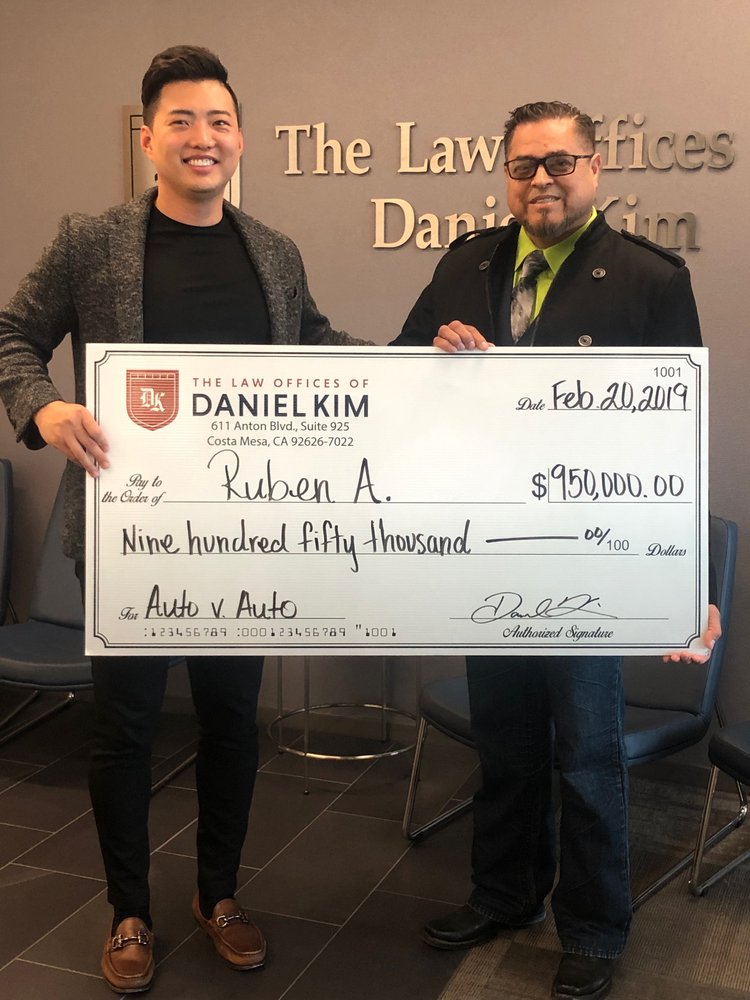We deal with this issue everyday for our clients that were injured and had to miss days and weeks at work due to the injuries they suffered in a car accident.
California law does allow a plaintiff to recover ‘lost wages’ in personal injury cases as long as those wages can be proven (in a way that is satisfactory).
Simply put, “lost wages” are the amount of money the plaintiff (injury victim) would have earned in the past if it wasn’t for the negligent acts of the defendant.
This process is complicated, and you will want attorney Daniel Kim on your side to help you fight this battle.
In addition, California law also allows a plaintiff to receive compensation for any anticipated future losses of income.
We put together this in-depth article below to help you understand how all these complex laws work.

Why Contact Law Office of Daniel Kim
When you get injured in a car accident, you need to understand that the insurance companies are going to put your through a lot of drama, because they don’t want to pay you a dime.
Once you file an injury claim, the opposing insurance company will start their fight to prove you were at fault, or at least place you partially at fault.
Daniel Kim and his legal team have years of experience helping car accident victims and fighting the insurance companies to make sure our clients get maximum compensation for the injuries they suffered.
When somebody is seriously injured, many times it will require the injury victim to miss hours or days from work, and when this happens you need to make sure that the insurance company also pays you for your lost wages.
Facts About Daniel Kim
- 99% client rating satisfaction
- Over 1000 reviews on Yelp and Google
- We help you get proper medical treatment
- You can contact us 24 hours a day, 7 days a week
- We have won hundreds of $$ millions for our clients
Dealing With The Insurance Companies
We wish we could tell you that the insurance companies love to do what is right, and that they will take care of accident victims, but we would be telling a lie.
The insurance companies are big corporations that are in business to make money, not to pay out money for injury claims and lost wages.
They love to deny claims, minimize claims, and do anything they can to put blame on the injured victims, to help delay the settlement process in hopes you will go away, but Daniel Kim will not go away..
We will fight for you all the way to the end.
What Are Lost Wages
Lost wages in California will include all amounts that a plaintiff (being you) would have earned at work if you had not been injured in the car accident.
This process is meant to help the injury victim recoup any earnings that were lost because the person was injured an unable to perform their job duties.
In a state like California where millions and millions of people live, lost wages are a very important factor in any personal injury settlement, and Daniel Kim will fight for you to make sure you get paid fairly.
“Lost wages” can include any of the following –
- Regular pay (salary or hourly)
- Overtime pay
- Any commissions
- Self-employment income
- Bonuses
- Personal, vacation or sick days
- Any other lost benefits like free meals or a car allowance, etc.
Get more information when you call us for a FREE consultation.
How Long Do I Have To File a Claim
In California the general statute of limitations is 2 years, but there are exceptions for accidents involving a public entity (like a Metro Bus) or an accident that involves a minor, medical malpractice, etc.
Again, these are the type of concerns that Daniel Kim and his staff will be happy to help you with to ensure you don’t get lost in the legal maze here in California.
Do not attempt to figure all of this out on your own, call us today for immediate help.
Are Lost Wages Taxable in California
This is another question that our clients ask us all the time.
In theory, damages for any lost wages in a California personal injury case are taxable.
The Internal Revenue Code section 104 states that gross income for all tax purposes does not include “the amount of any damages received (other than punitive damages) on the account of personal physical injuries or sickness.”
In the recent past the courts have generally held this to exclude any compensation for lost wages.
The lost income would have been taxable if it was earned, and so therefore the lost income is taxable when it’s recovered in a California injury lawsuit.
The problem is that in California typically personal injury settlements are one big “lump sum” that isn’t neatly broken up into compensation for physical injuries and lost wages.
In turn, this can make it difficult for anybody to determine how much, if any taxes are owed.
Your best bet is to consult with a tax professional to decisively determine what amount of money you might owe for taxes.
Do not overlook this step, because you don’t want the IRS to contact you 5 years later saying you owe them a bunch of money.

How Lost Wages Are Calculated
In California the law does require that any personal injury plaintiff (typically the accident victim) has to prove the amount of earnings they claim to have lost.
If you were injured for just a short period of time then the calculation is pretty easy to do, but it gets complicated if the plaintiff was due for a raise or whatever.
Because then it might be necessary to get testimony from a forensic accountant or an occupational expert to help the courts make a final decision.
Again, call us for answers, don’t fight this battle alone.
What Are Lost Wages Vs. Earning Capacity
This is a common question we get asked by our clients.
We will do our best to explain here briefly.
Lost wages typically refers to any past income that was lost (not able to be earned) as a result of a personal injury suffered by the victim.
It is the plaintiff’s out of pocket losses all the way up until the settlement date, or date of the trial.
This topic can get complicated, which is another reason we encourage you to contact Daniel Kim today for a FREE case evaluation so you can get answers to your questions.
In California, the law allows for a plaintiff to sue for the income they won’t be able to earn in the future because of an accident or injury.
This amount is usually referred to as “lost earning capacity” among California residents.
Having to prove any lost earning capacity is a different story and can be very difficult.
This situation usually demands testimony from a medical (or occupational) expert because you need to take into consideration things like getting a raise, any bonuses or other career development.

Proving Lost Wages in California
When it comes to actually proving lost wages in California, it’s not a simple or clear path to get there.
But we have done our best to break down the most common methods below.
Check out the different options and call us if you need a FREE consultation regarding your injury accident.
Getting a Lost Wages Letter from Your Employer
When the plaintiff has regular (stable) employment, then the easiest way to prove lost wages is with a combination of past pay stubs and a letter included from the plaintiff’s employer.
Any lost wages letter from a California employer should include –
- Employee’s job title
- Date on which the employee was hired
- Number of hours the employee normally works per week
- Confirmation that the employee is (or was) employed as of the date of the accident
- The employee’s regular pay rate and frequency of pay ($20 per hour, paid bi-monthly)
- Any sick and vacation days the employee had to use due to the injury
- The overtime rate (if applicable) to which the employee is entitled and the number of hours for overtime that are normally worked in a week
- How many days or hours of work that the employee missed, which would include missing work because of doctor appointments and medical treatment
- Any amount of overtime pay (within reason) that the employee could have expected to receive during this period

Past Pay Stubs and Tax Returns
Quite often it can be very hard for an employee to get a letter from his employer, or the plaintiff might be self-employed, etc.
When this is the situation, the plaintiff can prove lost wages with another method like past pay stubs or their income tax returns.
If need be the plaintiff can request a copy of their past tax return using IRS form 4506.
In addition you can use California Form FTB 3516 to find copies of past California tax filings from the California Tax Board.
Proving Lost Self-Employment Income
In order to try and recover any lost self-employed income here in California, you (the plaintiff) will need to prove what you would have earned during the period in question (when you were not able to work).
There are a number of documents that can help prove any lost self-employment –
- Tax returns from previous years
- Any billing statements for the months leading up to the accident itself
- When income is seasonal then billing statements for the same period during preceding years
When the plaintiff has a very high income (or just complicated with bonuses etc.) then it can be ideal to have a forensic accounting witness to testify in order to prove the income in question.
As you can tell, this whole process is very complicated, and trying to do this against an insurance company without a lawyer on your side is a bad idea.
Lost Overtime, Commissions or Bonus
Commissions, bonuses, overtime pay and other perks can be claimed as lost wages in California.
There are some common methods used to prove this speculative income (not limited to) –
- A written employment contract
- Past pay stubs showing a pattern of bonuses or overtime
- Proof of that employer’s polices for that income
- Some proof that any conditions for getting extra income were (or could have been) completed

Lost Personal Days, Sick Days and Vacation time
If a plaintiff was forced to use personal days, vacation days or sick days to cover their missed days at work, they can claim these as lost wages.
Basically, if the defendant hadn’t acted negligently, the plaintiff would have had those sick and vacation days available to them to use whenever they needed them.
In some instances, the plaintiff might have been able to even cash them out if the employer allowed this process.
Like all lost wages being sought, you will have to prove that the time was actually lost due to the accident (or injury) if you want to recover those damages.
How Can I Prove Income From Tips in California
This is by far the most difficult type of “lost wage” to prove, but it’s possible.
There are some popular ways to prove that you lost tips due to an injury and missed work.
Below is a partial list of ways to help prove you lost tips –
- The best is an employer’s letter verifying the amount that the plaintiff could have earned
- Any proof of income from prior pay periods like past bank deposits etc.
- Also previous tax returns work well
One common issue that can arise is that a plaintiff tries to claim they missed out on tip money, but in the past they didn’t report all the tips they earned.
This can set off a Red Flag with the IRS or California Franchise Tax Board because suddenly there is a discrepancy in what you say you made versus what you told the IRS you earned.
Recovering Unemployment Insurance Benefits
This is a complex issue, and you’ll want to consult with Daniel Kim about this.
The laws are created to protect all of us, but it definitely makes it harder to understand the legal process.
In order to be eligible for unemployment benefits in California, an employee needs to –
- be available and actively looking for employment
- be physically able to work
The tricky part to this is that somebody who is claiming lost wages, means they were not able to work in the past.
So in this situation the plaintiff would usually have been expected to file for disability benefits in California, instead of filing for unemployment.
There are of course exceptions to this rule, so contact our law firm today about your injury case and see if we can help.
